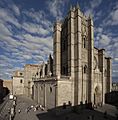Ávila, Spain facts for kids
Quick facts for kids
Ávila
|
|||
|---|---|---|---|
Ávila with its famous town walls
|
|||
|
|||
| Nickname(s):
Ávila de los Caballeros, Ávila del Rey, Ávila de los Leales
|
|||
| Motto(s):
Una ciudad para todos... (A town for everyone...)
|
|||
| Country | |||
| Autonomous community | |||
| Province | Ávila | ||
| Area | |||
| • Land | 231.9 km2 (89.5 sq mi) | ||
| Elevation | 1,132 m (3,714 ft) | ||
| Population
(2011)
|
|||
| • Total | 58,245 | ||
| Time zone | UTC+1 (CET) | ||
| • Summer (DST) | UTC+2 (CEST) | ||
| Postal code |
05001 - 05006
|
||
| Area code(s) | 34 (Spain) + 920 (Ávila) | ||
| Website | http://www.avila.es | ||
Ávila is a historic city in Castile and León, a region in central Spain. It is the capital city of the Province of Ávila. About 58,245 people lived here in 2010. Ávila is famous for its amazing medieval walls that completely surround the old town. It is also known for its many churches and convents.
What Makes Ávila Special?
Ávila is a very unique city, especially because of its well-preserved ancient walls. These walls are so important that they are a UNESCO World Heritage Site.
The Famous Walls of Ávila
The city of Ávila is most famous for its incredible medieval walls. These walls were built in the 11th century. They are one of the best examples of medieval walls in Europe.
How Big Are the Walls?
The walls are about 2.5 kilometers (1.5 miles) long. They have 87 towers and 9 gates. You can even walk along parts of the walls and see great views of the city and the countryside.
Why Were the Walls Built?
The walls were built to protect the city. They kept invaders out during medieval times. They show how important Ávila was as a military stronghold long ago.
Ávila's Rich History
Ávila has a long and interesting history. People have lived here since ancient times.
Who Lived in Ávila?
- Romans: The Romans were here first. You can still find some old Roman remains.
- Moors: Later, the Moors (from North Africa) ruled the city.
- Christians: In the 11th century, Christian kings took control of Ávila. They built the famous walls.
Saint Teresa of Ávila
Ávila is also known as the city of Saint Teresa. She was a very important Spanish nun and writer. She lived in the 16th century.
Who Was Saint Teresa?
Saint Teresa was a key figure in the Catholic Church. She started many new convents and wrote important books about faith. Her home city, Ávila, has several places connected to her life.
Where Can You Learn About Her?
The Convent of Santa Teresa is built on the site where she was born. It is a popular place for visitors.
Important Buildings and Landmarks
Besides the walls, Ávila has many other beautiful and historic buildings.
The Cathedral of Ávila
The Cathedral of Ávila is a very old and impressive church. It started as a fortress and then became a cathedral. It has a mix of Romanesque and Gothic styles.
Basilica of San Vicente
The Basilica of San Vicente is another important church. It is a great example of Romanesque architecture. It stands outside the city walls.
Los Cuatro Postes
Just outside the city, there is a monument called Los Cuatro Postes. It means "The Four Posts." It offers a fantastic panoramic view of the walled city. It's a popular spot for photos.
Life in Ávila Today
Today, Ávila is a quiet city. It is known for its history and religious sites. Tourism is important here. People come from all over the world to see the walls and learn about Saint Teresa.
What is the City Like?
Ávila is a peaceful place. It has narrow, winding streets inside the walls. It feels like stepping back in time. The city is also known for its cold winters because it is high up in the mountains.
What Can You Do?
Visitors can explore the old town, walk on the walls, and visit the many churches and convents. There are also local shops and restaurants.
Images for kids
See also
 In Spanish: Ávila para niños
In Spanish: Ávila para niños

















